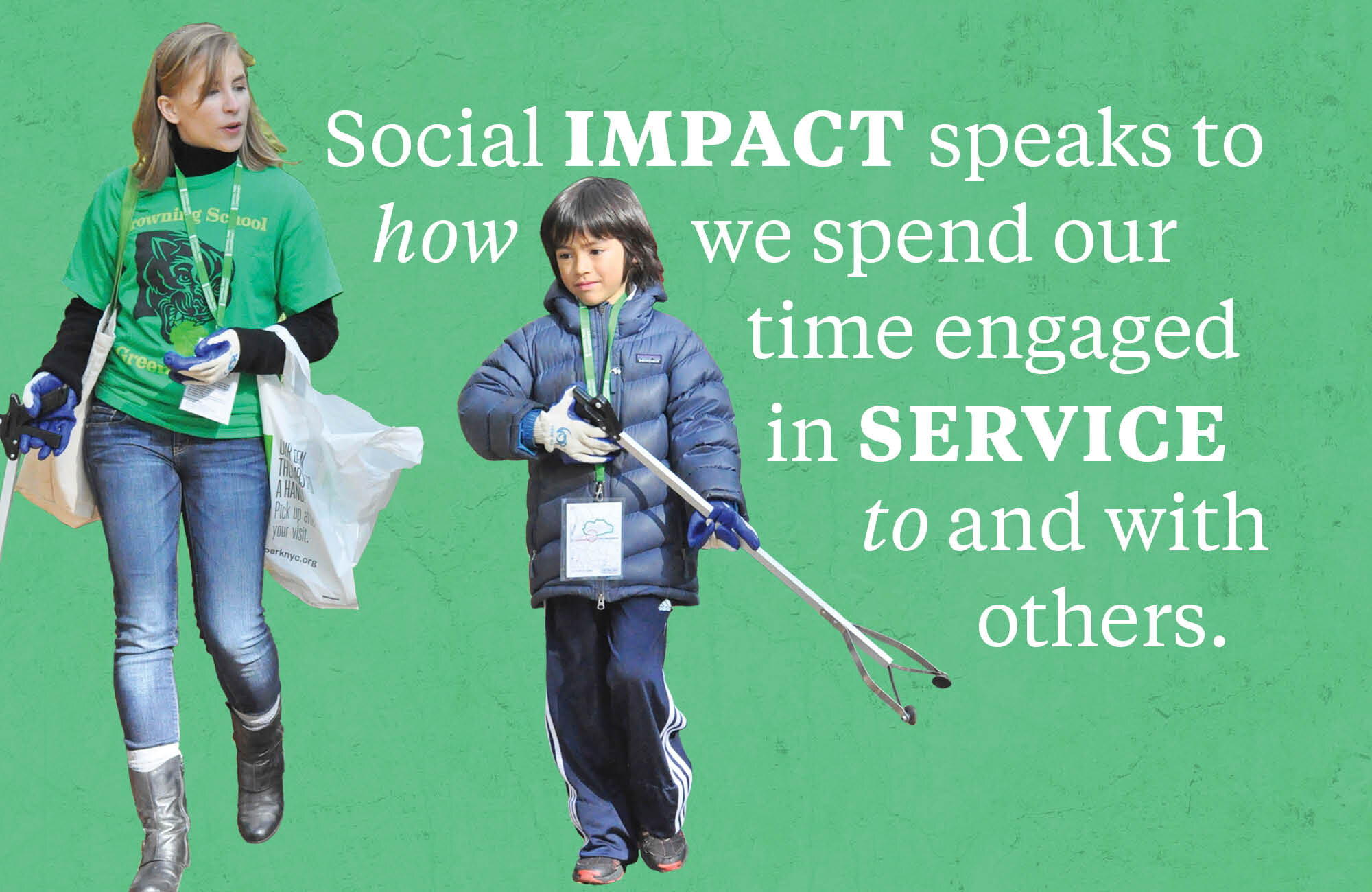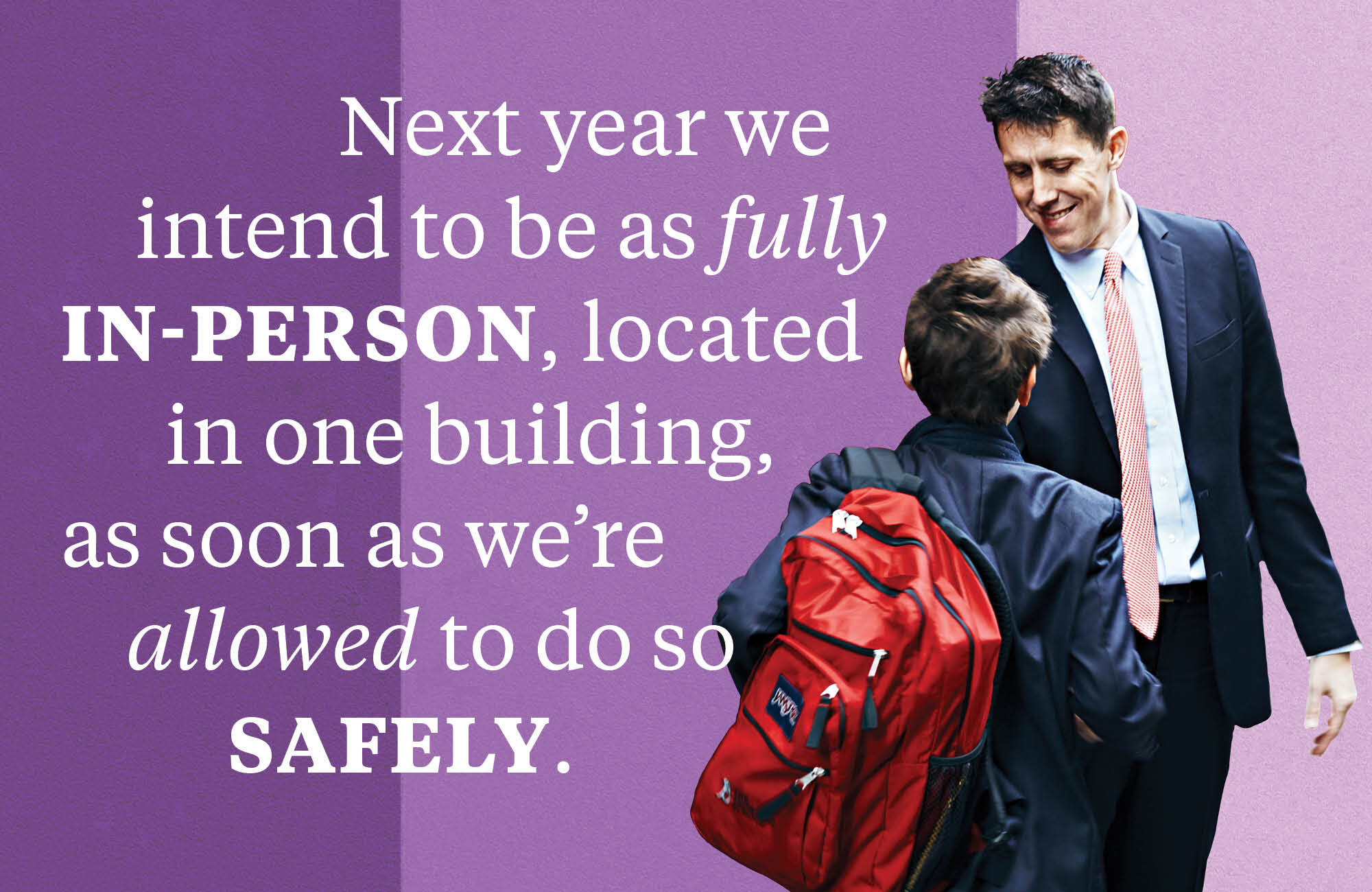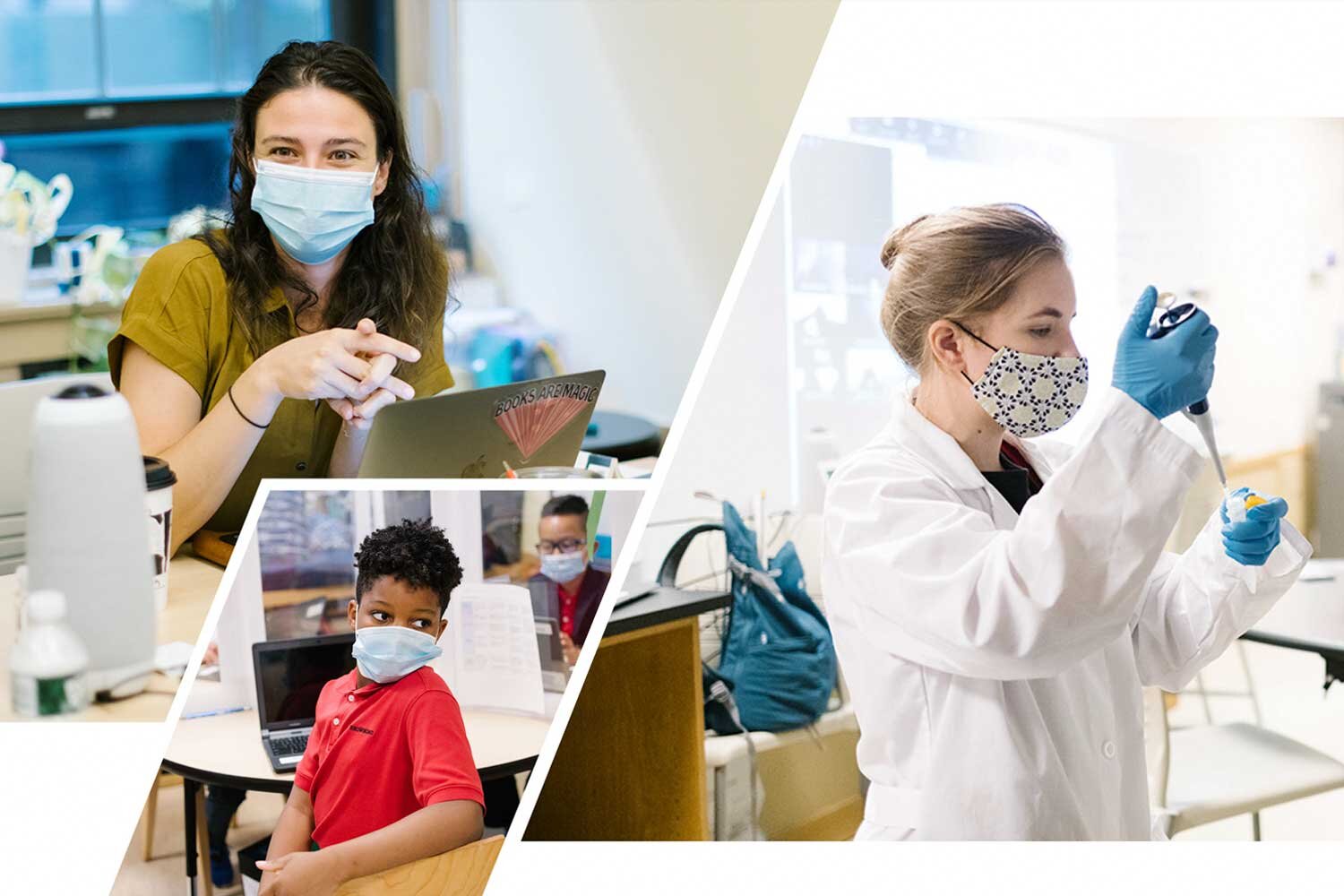Moving Forward, One Year On
A pandemic doesn't stop innovation at Browning.
march 2021
While the pandemic has reinforced just how much of life is outside of our control, what remains is our ability to imagine a Browning education next year and beyond. This year, while we have put the appropriate focus on health and safety that COVID-19 demands, it did not stop us from advancing the strength of our educational program and improving student life in several ways, even in this challenging time.
Over the past year, we’ve invested in getting more skilled and caring adults in front of and behind our boys, in line with our strategic plan to appropriately lighten teachers’ course loads, and provide them with added staff and administrative support. We’ve made important efforts in systematizing both our hiring and interview processes to help eliminate biases, expand sourcing of qualified candidates and to create more equitable protocols. We do this because all our boys—including the 40% who identify as boys of color—deserve to see themselves substantially reflected in the adults around them.
We continue to expend much of our energy on knowing, loving, and challenging boys. Faculty new to Browning participate in a division-head led course called “Teaching and Learning with Boys,” and our speakers series, “Today’s Boys, Tomorrow’s Men” has featured renowned experts on boys such as Michael Richert, Joseph Derrick Nelson and Pedro Noguera. Browning is not a boys’ school by accident, and therefore we are going to do all that we can to stay on the leading edge of research into how boys learn and grow best.
Spearheading much of this work will be Danielle Passno as she moves into a new role next year as Assistant Head of School for Teaching and Learning. We believe that the addition of this position—and Danielle’s assumption of it—will be building upon our longstanding academic excellence, and expanding our intellectual culture. Replacing Danielle as Head of Middle School will be Ronald Taylor, who is currently Acting Director of the Office for Identity, Culture, and Institutional Equity at Horace Mann School.
As part of our ongoing curriculum review we are building a curriculum that speaks to the whole of a boy’s experience, and have made investments in social-emotional learning, innovative Upper School elective courses, strong advisory and assembly curricula, and broad opportunities for leadership and teamwork. We’ve also begun to deepen our work with Columbia University’s Teachers College, which helps us administer and analyze an annual youth purpose survey for boys in Middle and Upper School.
All of this is supported by our Philosophy of Learning which explains our first educational principles, and serves essentially as our academic mission statement. It can be scaffolded to work for all age groups. Our philosophy begins in relationships and ends in purpose, and all of it shares what our school thinks is essential in terms of teaching boys, and how they learn.
We began this process of better aligning the School’s schedule to the ways boys learn best in the fall of 2019, by reducing the number of transitions the boys have—sometimes as many as 10 in a day—and also avoid several consecutive classes without a meaningful break or community interaction. We also wanted to extend learning periods for deeper inquiry and pedagogical creativity.
With these goals in mind, the committee then began to collect sample schedules from peer schools, research scheduling theory, and visit neighboring schools to better learn their approach to scheduling. And then—the pandemic arrived.
This fall, we implemented versions of the prototype into Middle School and Upper School in the name of creating longer blocks of learning time and meeting wellness goals. From here, we’ll create more prototypes based on the feedback that we’re getting from students and faculty and test and evaluate how these schedules align with our desired goals. A schedule change will be coming, with an eye toward improving the experience of boys and adults in all of the divisions—Lower, Middle, and Upper.
Competency-based learning allows us to state with more precision about what it means to aspire to excellence in a class. They make explicit what has too often been implicit by clearly indicating the learning goals of the class at hand, and what goes into being an excellent student of that particular course. So, rather than saying a good student of U.S. history does well on tests and writes strong papers, we might say that a good student of U.S. history is one who can integrate information from diverse primary and secondary sources into a coherent understanding of an idea, event, or structure, while also noting discrepancies among sources. And while the goal of competency-based learning is to ensure that more students learn the things that are essential and enduring about a particular class, the approach can also provide our faculty with more detailed or fine-grained information about our boys’ learning progress.
While grades will still be used on reports and in transcripts as a benchmark of overall learning and progress, we think this change will make clearer what is desirable in learning, and will demystify what teachers are hoping boys can achieve.
An exciting extension of our Philosophy of Learning will come to life in the Upper School next year. Certificates of Distinction, a new signature program, has three overarching qualities. It’s self-directed, individualized study; it’s competency based, focusing on a portfolio of work, and is characterized by successful performance, not just class time; and it’s both purpose-driven and community-minded.
At the end of Grade 9, boys can choose one of a number of pathways that will lead to a Distinction in a desired field. Through Grades 10 and 11, boys will be required to show evidence that they have mastered five to seven competencies, which when combined will lay out a pathway to the desired Distinction. When this portfolio demonstrates command of the necessary competencies—the boy will be called to plan a senior project around the idea of applying the learning of their Distinction to the good of the world beyond Browning. The culmination of all of this work is intended to be similar to a thesis presentation or a dissertation defense and would be evaluated by a panel of experts in the field, with faculty, scholars from within the Browning community, and relevant alumni composing the panel. Those boys who successfully presented would be awarded the Certificate of Distinction as part of their diploma and school transcript.
We believe it could deepen boys’ relationship with ideas, and offer more creative outlets for curious minds. It will give leadership opportunities to students and also to talented faculty. And it will offer a distinctive piece of learning evidence for the college admissions process. For both intrinsic and instrumental reasons, then, I think this can be an incredible boon for our Upper School boys, and allow them to tap into the power of their relationships, their imagination, and their curiosity. We envision pathways to distinction in the arts, or in environmental sustainability, or data science, or civic engagement, or entrepreneurship, or global studies.
Competencies exist beyond intellectual pursuits of course, and Panthers’ Purpose is our philosophy for incorporating social-emotional learning, character education, and an equity and belonging lens into the framework of our entire academic program, from Kindergarten through Grade 12. Through Panthers’ Purpose, we’re trying to define competencies for all the skills and dispositions that our students should acquire to become men of purpose. This program seeks to give boys a way to discover themselves in the building of character, in giving themselves to others, and in making a difference in our world.
These competencies will be appropriate to age and grade level. For example, in Grade 2 the management of emotions might be a competency, and the outcome it requires would involve a boy demonstrating self-control with prompting from his teacher. Or a Grade 2 competency might involve understanding healthy relationships, which requires that boys develop the skill of acting as an upstander in crucial moments.
As boys get older, we will introduce additional competencies that are more appropriate to their developmental age. In Middle School we might emphasize the importance of empathy to living well and maintaining relationships, and thus give boys practice in the skill of non-judgmental listening. Or in Upper School, we could identify the qualities of successful leadership, and model opportunities for boys to lead, to follow, and to discuss what role collaboration and decision-making form in creating healthy cultures and communities. There’s almost no end to the SEL, character, and equity architecture we can create to help boys become their fullest selves.
Browning seeks to “hardwire equity” at the level of structure. This is a term borrowed from the Educational Advisory Board, which describes it as utilizing frameworks and diagnostics to put equity at the center of policy and operations. When we hardwire equity, we put equity front and center in what community gatherings we schedule, in how we hire, in who contributes to policy discussions, and so on.
Equity competencies, which are being developed now, will give all faculty and staff explicit aims in our professional practices. While cultural competency has always been a goal of our professionals, now we will be stating that how we teach and what we teach can advance the cause of equity and committing to those practices.
Employees are also continuing their work with the Pacific Education Group, and we have begun to expand that opportunity to our families, on an optional basis. Over the past four years, PEG has helped give our professional community shared language and frameworks for courageous conversations about race.
Our Panther Mentors, that you’ve read about previously, continue to offer their presence for our young men of color. Our vision is that the Mentors will establish longitudinal relationships with our Upper School students that will allow those students to know that there are men who have walked the road that they’re walking. Eventually, we’d like to broaden this program to include multiple identity groups as mentors, and to give all boys a chance to learn from mentors.
Starting in the next school year, the person who leads us all in this work—now renamed equitable practices—will also steward our School’s social impact. Formerly known as community service or service learning, social impact speaks to how we spend our time engaged in service to and with others, and what those projects can teach us about ourselves and others. In this work, we seek to follow Bryan Stevenson, founder of the Equal Justice Initiative, who tells us that what we need to get proximate to others in order to help them, and in order to learn what they have to teach us. In shifting the frame and language from service learning to social impact, we seek to understand these as acts that connect us all, and where dignity is not a gift from one to another, but rather a sensibility that’s enacted by genuine human encounter. This is the spirit of mutual benefit and mutual learning that informs our program, and is one of the central expressions of our mission.
In the wake of the pandemic, the importance of human connection and interaction is going to increase but, at the same time, many schools are going to hold onto their online learning programs, and some will probably pivot toward heavy investment in such programs. And online learning is likely to be a part of a great many college experiences, so we’re going to have to look at how we prepare our boys for such a landscape, but without sacrificing the indispensable focus on relationships.
College itself is going to be worth watching. This year, there was a 2.5 percent drop in college enrollment, and the number of high school graduates going straight to college decreased by 13 percent. We could be seeing the normalization of gap years, which would really make the purpose work we’re doing at Browning that much more immediate for some of our boys. In this climate, a K-12 school that really knows its students’ stories, that offers an education that points to the development of specific competencies, and that gives students a chance to pursue distinction and leadership in all kinds of curricular and co-curricular areas will be positioned to thrive.
I think we’re also going to have to keep an eye on the wellbeing of all community members. We will have to find ways to provide wellness outlets and emotional support for all in our community and to stay mindful about our emotional conditions and our obligations to each other. We must foreground wellness, because we’ve all lived through trauma. Next school next year will be different because we are different.
Next year we intend to be as fully in-person, as fully mobile, and as fully located in one building as soon as we’re allowed to do so safely.
Even next September we are likely to continue with current mitigation practices such as wearing masks, washing our hands, and keeping windows and doors open. Everyone has a different risk tolerance, and that can make community life tricky—what really troubles some folks seems reasonable to others. We have to keep safety as the first order of community business, even as our understanding of what school safety looks like will continue to evolve.
In periods where the environment is volatile, uncertain, complex, and ambiguous, we run the risk that changing circumstances will render our plans irrelevant. Here’s where I think the size and the flexibility of our community really helped us over the past year. We were advantaged by being a community that has really valued relationships, and has given each other a high level of trust and patience. This allowed us to do so much this year that we might’ve missed otherwise. Faculty gave their trust and patience. Families gave their trust and patience. Everyone adjusted, and has worked hard to make the best of what’s around.
We’ve certainly learned more about how we can use technology to serve our community. Using Zoom and bringing on Canvas as our new learning management system in Middle and Upper School has really helped in some key ways. In the future, we’re going to think about how we organize community gatherings, admissions events, and so forth. There’s nothing like being together in person, but we should also remember how much access families gain by having events online as well.
We’ve always known that our boys really respond to the outdoor time. Our teachers have been tremendous in making this a priority this year, and we are hopeful that we may keep that in some form or fashion next year.
This year, we’ve made social-emotional learning even more important than usual, and that’s been to our collective benefit. Boys who respond best to intellectual challenge are the ones who are grounded in emotional literacy, healthy studentship skills, and a capacity for relationships. We’d be derelict if we didn’t learn the lesson.
Without the kind of teachers and staff and administrators we have here, none of this is possible. These are women and men who have taken on something colossal over the past 11 months. They built an online experience in the springtime. They spent their summer training for multiple scenarios this fall. They showed up in September, even as half the editorial writers in the nation’s papers were asserting that schools would be pathogenic incubators. In short, they showed wisdom, patience, courage, and forgiveness—and if that’s not leadership, I don’t know what is.
And our boys exhibited just how much perseverance students can show. Not every boy has had the kind of experience he would want this year, and it hasn’t always been easy, but our boys are so largely whole, so largely intact, and that speaks to their adult relationships, but also to their own capacity for making it through. None of us wanted this challenge, but so many of our boys have found a way to grow.
We hope that when the Red Doors open next year—in whatever form that may take—we can embrace the changes that this unprecedented time has wrought, seeing the opportunity, the resilience, and the best of the values of this community, reflected in how we have met that moment. I can say with full confidence that whatever comes to pass, Browning will be a school where you want your son to be.







